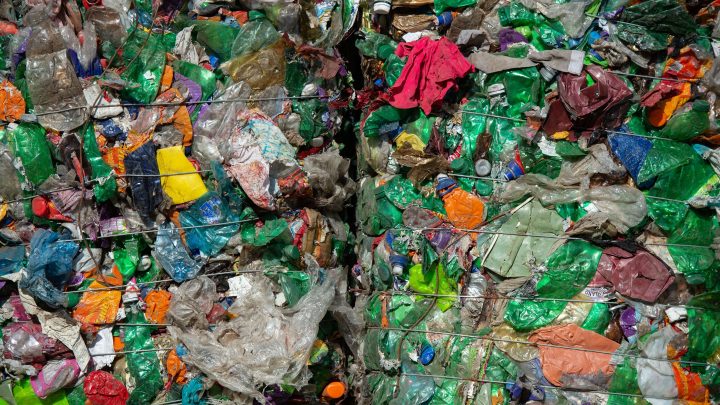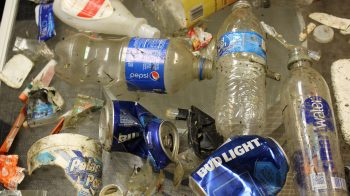
Keeping a diary of plastic use can be “a little horrifying”
Keeping a diary of plastic use can be “a little horrifying”

Many people keep diaries — of their spending habits, their diets, their moods — but keeping a diary of all the plastic products you use is probably one of the more stressful catalogs you can make. LA Times environmental reporter Susanne Rust tried it for a week — and said the results were “a little horrifying.”
“I thought I was actually pretty good at minimizing my plastic exposure,” Rust said. “But when I sat down to start this journal, I just looked around my desk and saw there was plastic everywhere.”
The petroleum byproduct is all around us, and we know it’s not good for our planet. There will be more plastic than fish in our oceans by 2050, according to a study by the Ellen MacArthur Foundation. But plastic was a $600 billion industry in 2022, and it’s projected to grow.
“There are definitely plastics that we all rely on now, that we need. They make our cars lighter, they protect your head when you’re riding your bicycle,” Rust said. “But there are ways of reducing single-use plastics.”
“Marketplace” host Kai Ryssdal talked to Rust about her experience cataloging all the plastic in her life and what it would take to meaningfully reduce our plastic consumption. Below is an edited transcript of their conversation.
Kai Ryssdal: So you have this conversation with your editor about doing a story maybe on plastic and your daily plastic interactions, I want you to tell me what happened that very first day you started to try to diary this when you’re sitting at your desk.
Susanne Rust: It was a little horrifying. I am an environment reporter. And I’ve written about plastic for years. And so I’m aware of plastic in the environment, aware of plastic in my house, and I thought I was actually pretty good at minimizing my plastic exposure. But when I sat down to start this journal, I just looked around my desk and saw there was plastic everywhere. I looked at my computer screen, at the casings around my windows, at my shoes, my belt, the pants I was wearing. I mean, plastic was literally everywhere. And then as I went through the subsequent days driving around, looking at the things in my car — all plastic. Going swimming, all the equipment I use — all plastic. Getting on a plane. I just became aware in a way that I hadn’t been before. How much I am surrounded by plastic all the time.
Ryssdal: Were you surprised? I mean, obviously, intellectually, you knew it. But as you started concentrating on it, were you surprised at how much plastic there is?
Rust: Oh, yeah. And that was the thing, right? Again, I was sort of intellectually aware of all of this, but as I started to take account, it was overwhelming.
Ryssdal: Is it too pat to say that plastic, given all the ways we use it — and I think if anybody listening to this just sits down for more than three seconds, they will do the same thing you did, and I did once I read your article, which is just be overwhelmed — is it too pat to say that plastic is the price of convenience?
Rust: That’s a hard question to answer. I think, in the moment, yes. We live lives where we look for ways to reduce our energy and efficiency all the time. And plastic is a really convenient solution for that. But I do know, environmentalists and governments are trying to figure out ways to make lives equally convenient, but not requiring all of the plastic that we now use to have that convenience. Does that make sense?
Ryssdal: Yeah, no, it makes total sense. And look, I when I asked it, I knew it was an impossible question. But you know, that’s kind of its kind of the countervailing force here though, for the environmentalists and the governments who are trying to help us help ourselves is that as you note, in this piece, plastics are a $600 billion industry. And it keeps on growing, because we keep using more.
Rust: Well, we do keep using more, but I do think that there is an awareness that more is getting into our environment, but more doesn’t necessarily need to be there. So for instance, I wrote about going to the grocery store, and I always get, you know, this big box of salad, and it comes in a big plastic box. But there are ways of providing that salad without using the box. I mean, it’s just everywhere you look, plastic is being introduced in places plastic doesn’t necessarily need to be.
Ryssdal: You actually called it in this piece, you called that diary-keeping process “soul-crushing.” And I guess my question is — you’re laughing so you don’t cry, right? — because the question is, what do we do?
Rust: Well, again, I mean, I think environmentalists are pushing governments to put a limit on the amount of plastic that is out there. I mean, there are definitely plastics that we all rely on now that we need, right? They make our cars lighter, they protect your head when you’re riding your bicycle so you don’t have to wear like a wooden helmet or a stone helmet or something, right. But there are ways of reducing these single-use plastics, which I think make up, I can’t remember the number, but it might be like 45% of all the plastics that we put into the environment. And there are ways of reducing that. So things can be done in places like California. Packaging laws have been enacted just to reduce those single-use plastics that, again, are not required for functioning in our lives.
There’s a lot happening in the world. Through it all, Marketplace is here for you.
You rely on Marketplace to break down the world’s events and tell you how it affects you in a fact-based, approachable way. We rely on your financial support to keep making that possible.
Your donation today powers the independent journalism that you rely on. For just $5/month, you can help sustain Marketplace so we can keep reporting on the things that matter to you.

















